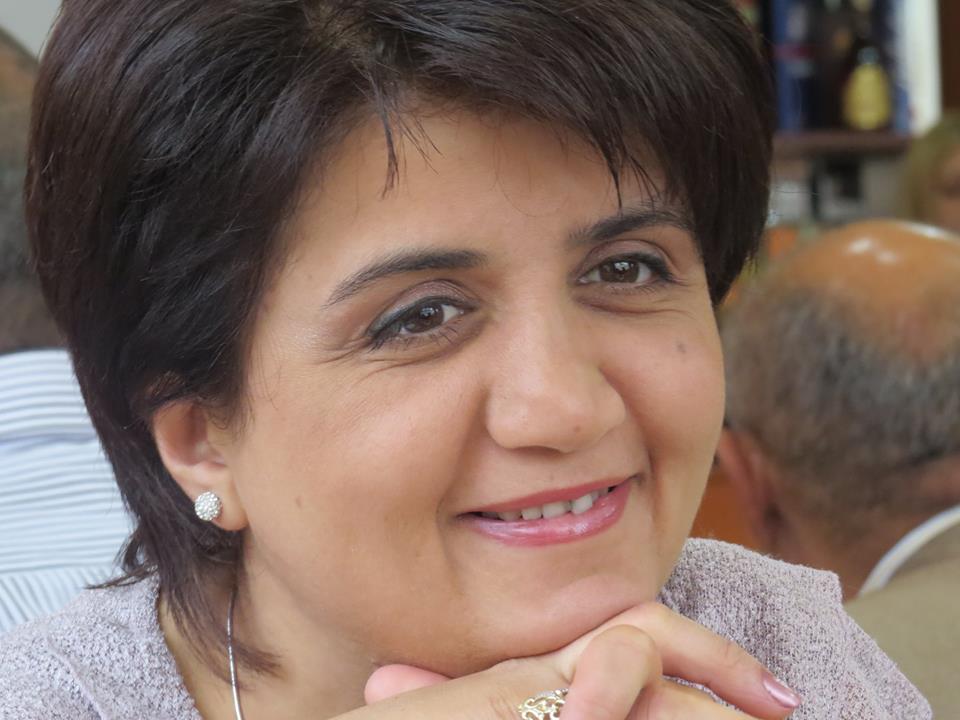“At Artsakh Public TV we get so many illogical calls and accusations over the course of a day. We understand people, but they have no idea that each of us has a relative on the front, that trying to smile on screen for the second day now, Tsovik’s husband is on the frontline; that Samvel has proclaimed on air news of the death of the child who grew up on his lap; that there are people who for several days are unaware of their relative on the frontline; that we eagerly call our colleagues who departed for the area, dismissing bad thoughts… that 10-year-old Nare coming from school to her mom’s workplace and discovering her mother not in the room at the moment might ask, is my mom on the frontline? that we too live in Stepanakert, with everyone, with everyone’s pain, also with our personal [matters], which we try to hide…”
Artsakh Public TV journalist Lusine Avanesyan posted this status update [in Armenian] on her Facebook page during the four-day clashes.
Recently, in conversation, Lusine said the hardest thing was answering people’s calls made off the air. “They would call and ask, why don’t you say that we have losses here? why don’t you say where such-and-such official is? A distinguished teacher called and said, please, announce that we will shoot whoever spreads panic-ridden news in the city. I said, ma’am, you have to help us in answering them; she says, I already answered to one person on the bus, and provides a harsh characterization.”
The boys were working off-site and, as someone who had done the news broadcast job in the past, Lusine inadvertently assumed the role of organizing the everyday work. “Being a calm person by nature, I became so hysterical these days…”
She is especially dissatisfied that their first urgent broadcast of news of the war that started at night was very late — it came after noon (on regular days, the first news broadcast is at 5 pm).
And in this regard, there was envy toward journalists from outside, including Armenia, who quickly reported their news. “In the first two days, it — Artsakh — was almost caught in an information blockade. To date, we have been unable to get the most anticipated words ‘dear compatriots…’ uttered from any official’s lips, and the people were waiting for this, and not for the statements directed to the outside world.”
“There was little attention to the internal demand for information. Everything was done for those having satellite broadcasting to disseminate more information, but they didn’t consider that the local audience needed local remarks. Our TV station wasn’t even invited to the NKR [Nagorno-Karabakh Republic] president’s meeting with journalists, which took place the day following military actions.”
Were the journalists who went to frontline afraid?
I don’t think so. All are boys have served [in the army]: Genady Yeremyan, Norayr Hovsepyan. And the camera operators working with them are largely people hardened by war: Benik Gharakhanyan, Artavazd Grigoryan, Merujan Hayrapetyan. Only camera operator Hayk Babayan is young.
Does Artsakh Public TV have special helmets and bulletproof vests for journalists? Those that are not the same color as the military uniform.
Noooo, what bulletproof vest, what helmet? Whatever the soldiers at the posts give [us], that’s it.
But you know that a reporter working in a war zone shouldn’t wear a military uniform, right?
We know, of course, we know. But in this case, personal safety is more important than what’s indicated in international conventions. And for employees of Artsakh media outlets, the boundary between the battlefront and job duties is a little incomprehensible.
Sometimes us girls would prepare for broadcast the material the boys brought back from the field. My girls also bore another responsibility — to instill calm also with our appearance and behavior. With an appearance that favorably differs at least from the everyday, a smile, to be the first to speak even to those with whom you don’t have such close contact — you tried to alleviate the tension, the anxiety somewhat.
I, conducting an interview from my comfortable desk in Yerevan, felt very small from Lusine’s stories. And, perhaps, not wanting to sadden me, my Artsakh colleague at the end told me one of their happy stories of those stressful days:
“In the department, we had been complaining for a few months that one of our curtain was fraying, falling apart. The management turned a deaf ear. On the morning of April 3, when all of us, stressed, everyone was occupied with their relatives and the day’s broadcast, suddenly our superintendent and our handyman came with new curtains and began to hang them. For a moment, it seems, we had entered another world.”
Ruzanna Khachatrian






